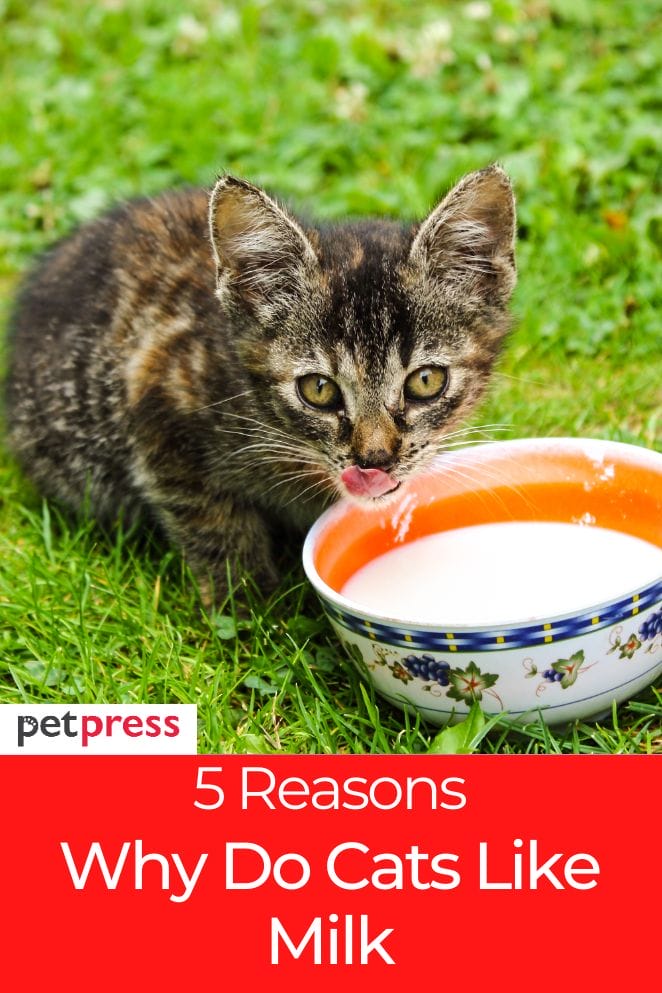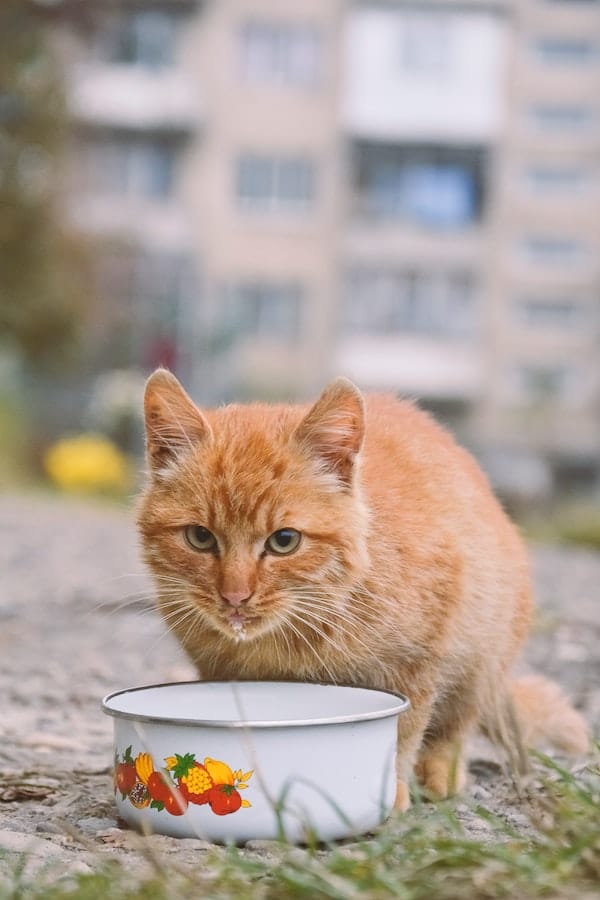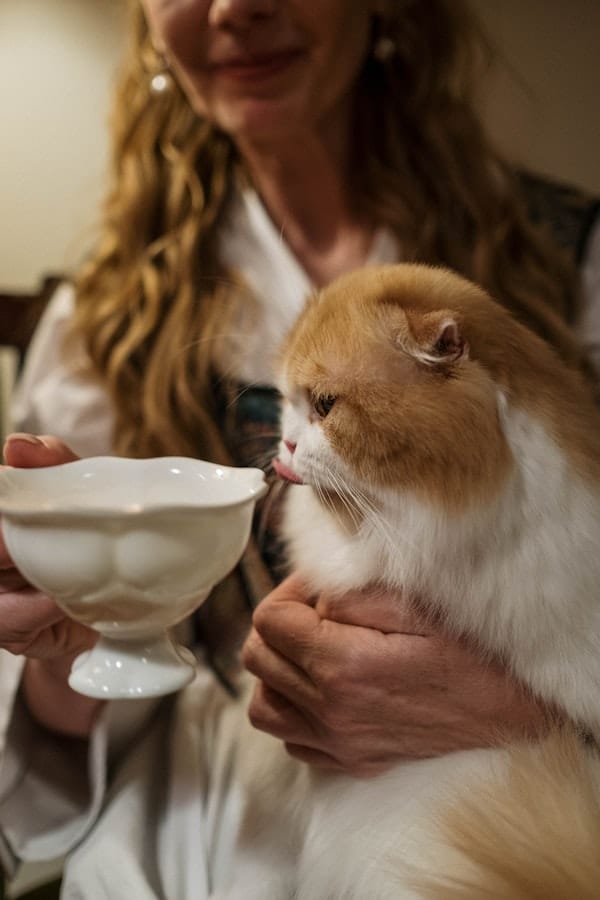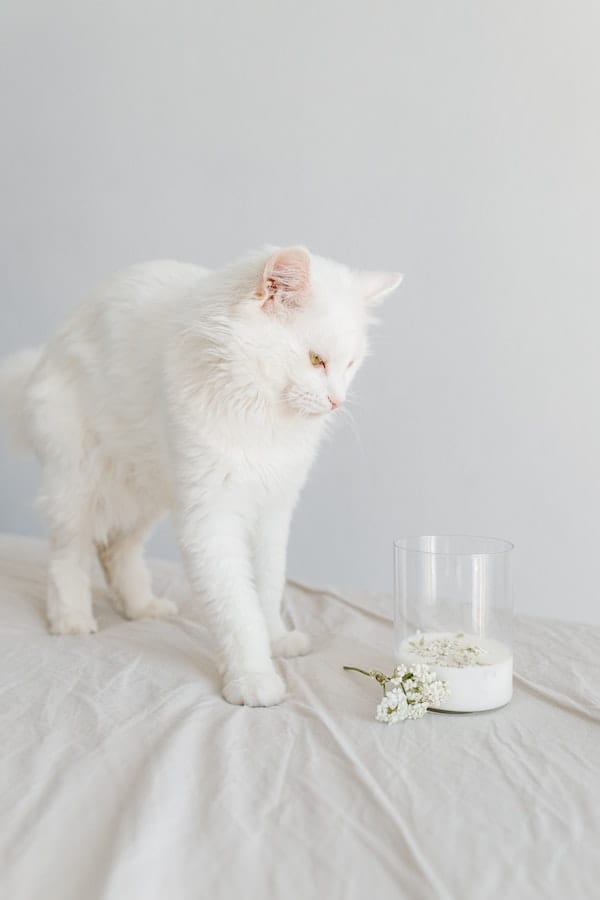
Cats and milk have a long-standing relationship, with cats often depicted in popular culture as enjoying their share of the dairy beverage.
But why do cats like milk?
Many people assume that cats innately possess a fondness for milk, but this may not be the case.
While some cats enjoy the taste and texture of milk, others may find it unappealing.
Through a closer look at cats’ dietary needs and preferences, we can gain valuable insight into this age-old question: why do cats like milk?
Why do cats like milk so much?

There are several possible explanations for why cats are drawn to milk. These include:
Dietary needs
Cats need a certain amount of calcium, fat and protein in their diet to remain healthy.
Milk is a good source of these nutrients, making it an attractive food choice for cats.
Although cats can get enough of these nutrients from other sources like wet foods or treats, some cats may still be drawn to the taste and texture of milk.
Cultural associations
Milk is culturally associated with cats in many countries.
This may be due to the fact that cats have been domesticated for thousands of years and were often given milk as a treat or reward.
As such, it has become an ingrained part of a cat’s diet in many cultures.
Furthermore, the association between cats and milk may also be linked to our own childhood experiences.
After all, who can forget those classic images of cats lapping up warm milk?
Evolutionary traits
The preference for milk could also be due to an evolutionary trait in cats known as “neophobia,” where cats are naturally averse to trying new foods.
This means that cats may be more likely to drink milk than other unfamiliar liquids since it is a familiar taste.
Additionally, this trait could explain why some cats don’t seem to like milk at all – they may simply have an aversion to the flavor or texture of the drink.
Flavor and texture preferences
Cats, like people, have individual flavor and texture preferences when it comes to food.
While some cats may find milk appealing for its sweet or creamy taste, others may not be as enticed by the flavor.
Similarly, some cats may enjoy the thick consistency of milk, while others might find it unappealing.
Ultimately, every cat is different and will have their own unique preferences when it comes to food.
Popular culture depictions
Cats have been depicted in popular culture for centuries, often as creatures that love to drink milk.
This may be due to the common association between cats and dairy products, or it could be a result of stories or works of art that feature cats enjoying milk.
Whatever the case may be, these depictions have certainly had a lasting impact on our perception of cats and milk.
Is milk safe for cats to drink?

While milk can be a nutritious addition to a cat’s diet, it should not replace other sources of nutrition.
In some cases, cats may be lactose-intolerant, which means they cannot digest milk properly and may experience gastrointestinal distress if they drink too much.
It is best to consult with your veterinarian before giving your cat any sort of dairy product.
There are several problems associated with cats drinking too much milk, including:
Weight gain
Cats that drink too much milk may gain weight due to the high-fat content of dairy products. This can lead to other health problems, such as diabetes or joint issues.
Additionally, cats should not be overfed any type of food, including milk, in order to maintain healthy body weight.
Dehydration
Milk is an excellent source of hydration for cats, but it should not be the only source.
Cats need to stay hydrated by drinking water, as milk does not contain enough electrolytes to sustain their bodies.
If a cat is dehydrated, it may become lethargic or experience other medical problems.
Gastrointestinal distress
Cats that are lactose-intolerant may experience digestive issues after drinking too much milk.
Symptoms of gastrointestinal distress can include vomiting, diarrhea, or abdominal pain.
It is important to pay attention to any changes in your cat’s behavior after consuming dairy products and to contact a veterinarian if necessary.
Tummy upsets/diarrhea
Cats that are lactose-intolerant may experience digestive issues after drinking milk, such as stomach upset and diarrhea.
In some cases, cats may also vomit or have abdominal pain.
It is important to note any changes in your cat’s behavior after consuming dairy products and to contact a veterinarian if necessary.
Additionally, it is best to limit the amount of milk that cats drink in order to avoid gastrointestinal distress.
Vomiting
Cats that are lactose-intolerant may experience digestive issues after drinking milk, such as vomiting.
In some cases, cats may also have diarrhea or abdominal pain. It is important to note any changes in your cat’s behavior after consuming dairy products and to contact a veterinarian if necessary.
Allergies
Cats can develop food allergies after drinking milk, which may include symptoms such as sneezing, coughing, vomiting, or skin irritation.
If your cat develops any of these signs after consuming dairy products, it is important to contact a veterinarian for more information and treatment recommendations.
Additionally, cats should be monitored for any changes in their behavior after consuming dairy products, and the amount of milk given should be limited.
Nutritional imbalances
Drinking too much milk can lead to nutritional imbalances in cats, such as an excess of calcium or fat. This can cause health problems and should be avoided.
Additionally, cats need a balanced diet that includes food sources other than dairy products in order to ensure they are receiving all the necessary nutrients.
Final thoughts

While milk can be a part of a cat’s diet, it should not replace other sources of nutrition.
Additionally, cats that are lactose-intolerant or have food allergies may experience gastrointestinal distress or other medical problems if they drink too much milk.
As such, it is important to consult with your veterinarian before giving your cat any sort of dairy product and to monitor your cat’s behavior after consumption.
Additionally, cats should be given plenty of water to stay hydrated and maintain a balanced diet with food sources other than milk in order to ensure they receive all the necessary nutrients.
- Does Cat Litter Melt Ice? The Complete Guide to Winter Safety - January 30, 2026
- Happy Tail Dogs: Understanding This Common Canine Condition - January 29, 2026
- How Cold Can Outdoor Cats Handle? Feline Winter Safety - January 27, 2026


GIPHY App Key not set. Please check settings